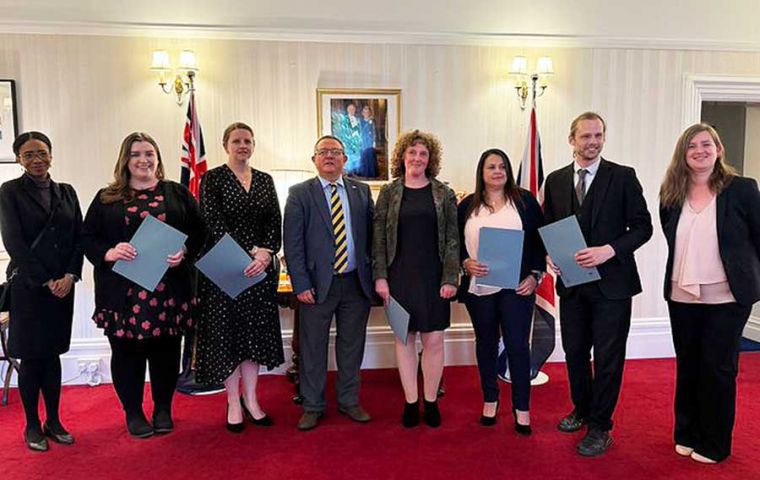MercoPress. South Atlantic News Agency
Falklands names five new Justices of the Peace
 Acting Governor Dave Morgan with the newly sworn Justices of the Peace, at Government House
Acting Governor Dave Morgan with the newly sworn Justices of the Peace, at Government House Congratulations have been extended to the newest Justices of the Peace for the Falkland Islands who were appointed and sworn in by the Acting Governor Dave Morgan at Government House. The 5 new JPs: Eleanor Cornick, Scott Descombe, Zoe James, Kerry McRae and Molly Semple. This year also marked Andrew Brownlee's 25th year as Justice of the Peace for the Falklands.
Under English Law the office of Justice of the Peace or JP has existed for hundreds of years. People holding the office perform an essential public service by dispensing justice within their community; hearing a range of criminal & non-criminal cases in the Summary Court. The Summary Court is the first tier within our Justice System. It is comprised of:
- The Adult Court – for criminal cases involving people over 18.
- The Youth Court – for cases involving young people aged from 10-17.
- The Family Proceedings Court – where some family disputes are settled.
Justices do not hear cases on their own. They usually sit as one of a bench of three JPs, together with a qualified Legal Adviser who is there to advice on points of law and procedure.
It is a constitutional right for individuals to have a fair hearing by an independent and impartial court.
JPs can hear cases in the family court which involve the welfare and upbringing of children. This can include whether children are removed from the care of their parents and also disputes between separated parents and the arrangements for their children.
Justices are responsible for granting or refusing licenses to people who want to sell alcohol to the public.
Justices of the Peace do not need any formal qualifications at all. Nor do they need previous legal training or experience. JPs are fully trained and advised by a legally qualified adviser and they are provided with structures to assist them with their decision making, along with guidelines for deciding upon sentence.
And to be a JP in the Falklands you must be 1) A Commonwealth Citizen; and 2) Aged 18 years or over.
JPs ordinarily retire from the bench at the age of 70 and it is normally expected that a period of five years' service will take place before retirement.
There are six key qualities which are regarded as vital for a person to perform successfully in the role of a JP.
Good Character, Personal integrity – respect and trust of others – respect of confidences – absence of any matter which might bring them or the Judiciary into disrepute – willingness to be circumspect in private, working and public life.
Understanding and Communication, meaning ability to understand the law and legal documents with training and advice, ability to identify and comprehend relevant facts, to follow evidence and arguments, ability to concentrate, ability to communicate effectively.
Social Awareness, Appreciation and acceptance of the rule of law – understanding of society in general – respect for people from different ethnic, cultural or social backgrounds
Maturity and Sound Temperament Ability to relate to and work with others – regard for the views of others – willingness to consider advice – decisiveness – confidence – a sense of fairness – courtesy.
Sound Judgement Ability to think logically, weigh arguments and reach a balanced and just decision – openness of mind – objectivity – absence of bias.
Commitment and Reliability, commitment to serve the community – willingness to undertake the required training – and ability to offer the requisite time.




Top Comments
Disclaimer & comment rulesCommenting for this story is now closed.
If you have a Facebook account, become a fan and comment on our Facebook Page!